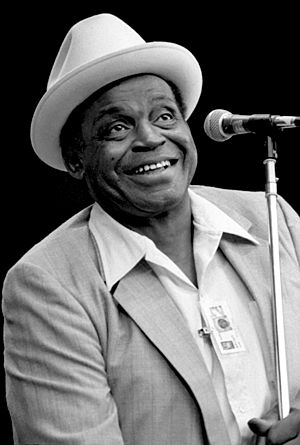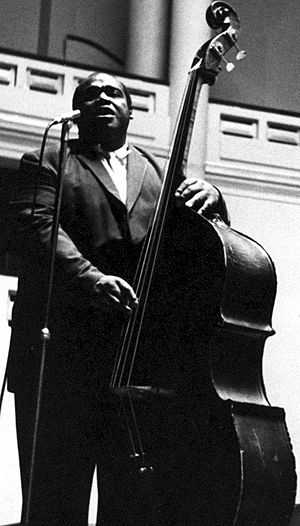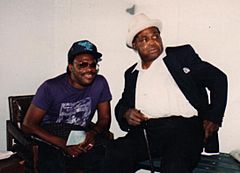Willie Dixon facts for kids
Quick facts for kids
Willie Dixon
|
|
|---|---|

Dixon at Monterey Jazz Festival 1981
|
|
| Background information | |
| Birth name | William James Dixon |
| Born | July 1, 1915 Vicksburg, Mississippi, U.S. |
| Died | January 29, 1992 (aged 76) Burbank, California |
| Genres | |
| Occupation(s) |
|
| Instruments |
|
| Years active | 1939–1992 |
| Labels |
|
| Associated acts | Big Three Trio |
William James Dixon (born July 1, 1915 – died January 29, 1992) was an American blues musician. He was a singer, songwriter, and record producer. Willie Dixon played the upright bass and guitar. He was known for his unique singing voice.
Dixon is famous for writing many songs. He helped shape the sound of Chicago blues music after World War II. Many famous musicians have recorded his songs. Some of his most well-known songs include "Hoochie Coochie Man", "Little Red Rooster", and "My Babe". He wrote these songs for Chess Records between 1950 and 1965. Artists like Muddy Waters and Howlin' Wolf performed them.
Willie Dixon was also important for connecting blues music to rock and roll. He worked with Chuck Berry and Bo Diddley. In the 1960s, many rock artists used his songs. He won a Grammy Award. He is in the Blues Hall of Fame, the Rock and Roll Hall of Fame, and the Songwriters Hall of Fame.
Contents
Willie Dixon's Story
Early Life and Music
Willie Dixon was born in Vicksburg, Mississippi, on July 1, 1915. He was one of fourteen children. His mother, Daisy, often spoke in rhymes, and Willie copied her. When he was seven, he loved a band with a pianist named Little Brother Montgomery. Willie sang his first song at church when he was four.
He first learned about the blues when he was a teenager. Later, he learned to sing harmony from Theo Phelps. Theo led a gospel singing group called the Union Jubilee Singers. Willie sang bass in this group. They often performed on the radio station WQBC in Vicksburg. Willie started turning his poems into songs and even sold some.
Moving to Chicago
In 1936, Willie Dixon moved to Chicago. He was a very tall and strong man, standing 6 feet 6 inches tall. He started boxing and was very good at it. In 1937, he won the Illinois State Golden Gloves Heavyweight Championship. He even worked for a short time as a sparring partner for the famous boxer Joe Louis. But he stopped boxing after a disagreement about money.
Willie met Leonard Caston at a boxing gym. They would sing harmonies together. Willie sang in several groups in Chicago. But it was Caston who encouraged him to focus on music. Caston even built Willie his first bass guitar from a tin can and one string. Willie already knew how to sing bass, so playing the instrument felt natural. He also learned to play the guitar.
In 1939, Willie Dixon helped start a group called the Five Breezes. They mixed blues, jazz, and singing harmonies. Willie's progress on the upright bass paused during World War II. He refused to join the military because he believed it was wrong to fight for a country where people were treated unfairly based on their race. He was in prison for ten months because of this. After the war, he formed another group called the Four Jumps of Jive. Then he joined with Caston again to form the Big Three Trio. This group recorded music for Columbia Records.
Becoming a Music Legend
Willie Dixon joined Chess Records as a recording artist. But he started spending more time working behind the scenes. By 1951, he worked full-time at Chess. He was a producer, finding new talent, playing music for recordings, and writing songs for the label. He also produced music for Chess's other company, Checker Records. Even though he sometimes had disagreements with Chess, he stayed with them for many years. During this time, he created a lot of music and had a huge impact. He also worked for Cobra Records, producing early songs for artists like Otis Rush and Buddy Guy.
Willie Dixon is seen as one of the most important people in creating Chicago blues. He worked with many famous musicians. These include Chuck Berry, Muddy Waters, Howlin' Wolf, Bo Diddley, and Koko Taylor.
In December 1964, The Rolling Stones had a number one hit song in the UK. It was their version of Willie Dixon's song "Little Red Rooster".
Fighting for Musicians' Rights
In his later years, Willie Dixon became a strong supporter of blues musicians. He started the Blues Heaven Foundation. This group helps keep the history of the blues alive. It also works to make sure blues musicians get paid fairly for their songs. Many musicians in the past were not paid what they deserved.
Willie Dixon famously said, "The blues are the roots and the other musics are the fruits." He meant that blues music is the foundation for many other types of music. He believed that keeping the blues alive would help all American music.
In 1977, Willie Dixon and Muddy Waters sued Arc Music. This was Chess's publishing company. They were unhappy with the small amount of money they received for their songs. After they settled the lawsuit, they started their own music publishing company called Hoochie Coochie Music.
In 1987, Willie Dixon settled a lawsuit with the rock band Led Zeppelin. He said they used parts of his songs "Bring It On Home" and "You Need Love" in their music without permission.
Later Years and Legacy
Willie Dixon's health got worse in the 1970s and 1980s. He had long-term health problems. He was inducted into the Blues Hall of Fame in 1980. In 1989, he won a Grammy Award for his album Hidden Charms.
Willie Dixon passed away on January 29, 1992. He was buried in Burr Oak Cemetery in Illinois. After he died, his wife, Marie Dixon, continued his work with the Blues Heaven Foundation. She moved its main office to the old Chess Records building. In 1994, Willie Dixon was added to the Rock and Roll Hall of Fame. In 2013, he was also inducted into the Chicago Blues Hall of Fame.
In 2007, a special marker was placed in Vicksburg, Mississippi, to honor Willie Dixon. It is part of the Mississippi Blues Trail. The actor Cedric the Entertainer played Willie Dixon in the 2008 movie Cadillac Records. This film was about the early history of Chess Records.
Famous Songs by Willie Dixon
Willie Dixon wrote or helped write over 500 songs. Many of them became classic blues songs. These include "Help Me", "Hoochie Coochie Man", "I Can't Quit You Baby", "I'm Ready", "Little Red Rooster", "My Babe", and "Spoonful".
Other songs he wrote that became popular include "Evil" (by Howlin' Wolf) and "You Can't Judge a Book by the Cover" (by Bo Diddley). In the 1960s, many rock artists used his songs.
Discography
Albums
| Year | Title | Label | Number | Comments |
| 1959 | Willie's Blues | Bluesville | BVLP-1003 | With Memphis Slim |
| 1960 | Blues Every Which Way | Verve | MGV-3007 | With Memphis Slim |
| 1960 | Songs of Memphis Slim and "Wee Willie" Dixon | Folkways | FW-2385 | |
| 1962 | Memphis Slim and Willie Dixon at the Village Gate | Folkways | FA-2386 | Live, with Pete Seeger |
| 1963 | In Paris: Baby Please Come Home! | Battle | BM-6122 | With Memphis Slim, 1962 |
| 1970 | I Am the Blues | Columbia | PC-9987 | With the Chicago All Stars; also released on DVD, 2003 |
| 1971 | Willie Dixon's Peace? | Yambo | 777-15 | With the Chicago All Stars |
| 1973 | Catalyst | Ovation | OVQD-1433 | Quadraphonic pressing |
| 1976 | What Happened to My Blues | Ovation | OV-1705 | |
| 1983 | Mighty Earthquake and Hurricane | Pausa | PR-7157 | |
| 1985 | Willie Dixon: Live (Backstage Access) | Pausa | PR-7183 | With Sugar Blue and Clifton James, Montreux, 1985 |
| 1988 | Hidden Charms | Bug | C1-90593 | Grammy-winning album |
| 1988 | Willie Dixon: The Chess Box | Chess | CHD2-16500 | Mix of Dixon's own with well-known Chess artists' recordings |
| 1989 | Ginger Ale Afternoon | Varèse Sarabande | VSD-5234 | Soundtrack for movie of the same name |
| 1990 | The Big Three Trio | Legacy | C-46216 | Recorded 1947–1952 |
| 1993 | Willie Dixon's Blues Dixonary | Roots | RTS 33046 | EAN: 8712177013760 |
| 1995 | The Original Wang Dang Doodle: The Chess Recordings | MCA | 9353 | 1954–1990 recordings (some previously unreleased) |
| 1996 | Crying the Blues: Live in Concert | Thunderbolt | CDTB-166 | Live, with Johnny Winter and the Chicago All Stars, Houston, 1971 |
| 1998 | Good Advice | Wolf | 120,700 | Live, with the Chicago All Stars, Long Beach, 1991 |
| 1998 | I Think I Got the Blues | Prevue | 17 | |
| 2001 | Big Boss Men: Blues Legends of the Sixties | Indigo (UK) | IGOXCD543 | Live, Houston, 1971–72 (six tracks) |
| 2008 | Giant of the Blues | Blues Boulevard Records | 250196 | EAN: 5413992501960 |
See also
 In Spanish: Willie Dixon para niños
In Spanish: Willie Dixon para niños



